2021-2022 年河北石家庄高一英语上学期期末试卷及答案
第一部分 听力(共两节,满分 30 分)
做题时,先将答案标在试卷上。录音内容结束后,你将有两分钟的时间将试卷上的答案转
涂到答题卡上。
第一节(共 5 小题;每小题 1.5 分,满分 7.5 分)
听下面 5 段对话。每段对话后有一个小题,从题中所给的 A、B、C 三个选项中选出最佳选
项,并标在试卷的相应位置。听完每段对话后,你都有 10 秒钟的时间来回答有关小题和阅
读下一小题。每段对话仅读一遍。
例:How much is the shirt?
A. £19.15. B. £9.18. C. £9.15.
答案是 C。
1. How will the woman get in touch with Ann?
A. By telephone. B. By email. C. By mail.
2. How many people were injured in the fire?
A. 12. B. 25. C. 37.
3. Why does the man call the woman?
A. To see whether she is busy. B. To help her finish her paper.
C. To invite her to a concert.
4.W hat does the woman suggest the man do?
A. Borrow some books in French. B. Read some French storybooks.
C. Read fast to get a general idea.
5. What are the speakers mainly talking about?
A. A garage. B. An advertisement. C. A WeChat group.
第二节(共 15 小题;每小题 1.5 分,满分 22.5 分)
听下面 5 段对话或独白。每段对话或独白后有几个小题,从题中所给的 A、B、C 三个选项
中选出最佳选项,并标在试卷的相应位置。听每段对话或独白前,你将有时间阅读各个小
题,每小题 5 秒钟;听完后,各小题将给出 5 秒钟的作答时间。每段对话或独白读两遍。
听第 6 段材料,回答第 6、7 题。
6. What is the relationship between the speakers?
A. Classmates. B. Neighbors. C. Colleagues.
7. How did Bernard probably come today?
A. By car. B. By subway. C. By bus.
听第 7 段材料,回答第 8、9 题。
8. What does the company require the staff to do?
A. Control the lunch time. B. Hand in reports daily.
C. Work on weekends.
9. What should the man do before he starts work?
A. Read the company’s rules. B. Take a medical examination.
C. Go through special training.
听第 8 段材料,回答第 10 至 12 题。
10. What can we learn about the girl?
�
A. She is eager to go back to school. B. She has just got her timetable.
C. She dislikes Miss Counter.
11. What is the boy’s first class?
A. Geography. B. English. C. Math.
12. What is the boy’s opinion about Mr. Shaw?
A. He is too strict. B. He is frightening. C. He is good at teaching.
听第 9 段材料,回答第 13 至 16 题。
13. Where is the woman from?
A. America. B. Sweden. C. Egypt.
14. What are the speakers doing?
A. Taking a Spanish lesson. B. Recording a program.
C. Giving a performance.
15. What is the last question about?
A. A sport. B. A restaurant. C. A dam.
16. How many prizes does the woman win?
A. One. B. Two. C. Three.
听第 10 段材料,回答第 17 至 20 题。
17. What is Alexander Manette?
A. An officer. B. A writer. C. A doctor.
18. When did Alexander Manette disappear?
A. In 1757. B. In 1775. C. In 1789.
19. How did people know what had happened to Alexander Manette?
A. He told them about it.
C. They read what he’d written down.
20. What is said about Alexander Manette?
A. He was put into the prison in the winter. B. He destroyed the Bastille with other
people.
C. He couldn’t remember anything after he was set free.
第二部分 阅读理解(共两节,满分 50 分)
第一节(共 15 小题;每小题 2.5 分,满分 37.5 分)
阅读下列短文,从每题所给的 A、B、C 和 D 四个选项中,选出最佳选项。
B. They heard of it from others.
A
FOUR BEST BOOKSHOPS IN LONDON
Looking for something to read while in London? If so, you’re in luck: the British
capital happens to have an incredible collection of bookshops.
Daunt Books
Are you going on a trip and want to read a novel or nonfiction book set in the
place you’re headed? This bookshop arranges books by country, so it’s easy to find
anything by place. (83 Marylebone High Street. Monday-Saturday: 09:00-19:30; Sunday:
11:00-18:00.)
Foyles Books
Dig, if you will, the picture: four miles of shelves holding up to 200,000 books.
This legendary (传奇的) bookshop is impossible to leave empty-handed. It was once
�
listed in the Guinness Book of World Records as the biggest bookshop on the planet.
(107 Charing Cross Road. Monday-Saturday: 9:00-21:00; Sunday: 11:30-18:00.)
Hatchards
In the year 1797, this London bookshop—the oldest in the city today—first
flicked on its lights. It stocks an excellent selection of fiction, nonfiction,
history and other genres. (187 Piccadilly Street. Monday-Saturday: 09:30-20:00;
Sunday: 12:00-18:30.)
London Review Bookshop
There’s an excellent selection of history, philosophy, politics, new fiction
and many other genres here. Plus, there’s a nice cafe in which you can crack open
that tome (巨著) for the first time and start reading. (14 Bury Place.
Monday-Saturday 10:00-18:30; Sunday 12:00-18:00.)
1. Which bookstore was listed in the Guinness Book of World Records?
A. Daunt Books.
C. Hatchards.
2. What is special about Hatchards?
A. It has a long history.
C. It has a cafe.
nonfiction books.
3. Which place should you go to if you want to enjoy reading with a coffee?
A. 83 Marylebone High Street.
C. 187 Piccadilly Street.
【1~3 题答案】
【答案】1. B
B. It has 200,000 books.
D. It has both fiction and
B. 107 Charing Cross Road.
D. 14 Bury Place.
B. Foyles Books.
D. London Review Bookshop.
2. A
3. D
B
In the Pacific Northwest during winter, 5:15 a.m. might be the dead of night.
The alarm goes off and the only light is the red glow from my clock. My body says,
“Go back to bed.” But I don’t. I know my running partner will be waiting in the
street and I’m not going to stand her up. Then I walk onto the road, complaining
about the cold and wishing I were back under my warm covers.
If you’d have asked me a year ago if I could see myself running at 5:15 on a
winter morning, I’d have laughed. Morning just wasn’t my thing and running in the
morning was something I didn’t even consider. “I prefer to work out in the middle
of the morning or in the afternoon,” I’d say to my friends who go to the gym before
work.
Then, last fall I reconnected with an old friend. She’d been running in the
morning and taken off forty pounds. When I looked in the mirror, I knew I could benefit
from the same kind of weight loss. I asked if I could join her. I knew I needed to
change something if I was going to get back in shape.
The first two months were especially hard, because we ran twice a week at 5:15
a.m. and I slept till 7:00 the other mornings. But as I’ve adjusted to the routine
of running, I’ve discovered great joys that make it even more worthwhile than a
little weight loss.
�
While I haven’t lost forty pounds yet, it’s amazing how much more energy I
have and how much stronger I feel. Because of the morning run, the rest of my day
is more productive. I wouldn’t say I’ve become a morning person, but I would say
morning running is now my thing.
4. What can we know about the author from paragraph 1?
A. 5:15 a.m. is the best time for her to exercise.
B. She prefers to run alone without any company.
C. She goes for a run despite the cold and early rise.
D. She always takes the run with many warm clothes on.
5. What was the author’s attitude to morning running a year ago?
A. Unfavorable.
Supportive.
6. What made the author begin to run in the morning?
A. Her partner’s encouragement.
C. Realizing the harm of being fat.
running.
7. What effect does morning running have on the author?
A. She has become slim again.
C. She has become more confident.
【4~7 题答案】
【答案】4. C
B. She has become more energetic.
D. She has become more imaginative.
B. Her friend’s suggestion.
D. Realizing the benefits of
C. Confused.
5. A
6. D
7. B
B. Scared.
D.
C
Local officials in Beijing promised to further protect the city’s cultural
heritage, in particular the narrow streets known as hutongs.
Hutongs are commonly found in the cities of North China, but they are at risk.
Beijing is currently believed to have fewer than 1,000 hutongs, most of which are
near the Imperial Palaces. Only 60 years ago, the number was 3,250. In the old
districts of Dongcheng and Xicheng, which cover 62 square kilometers, some people
will be asked to move from hutong houses to avoid further damage to the ancient
architecture.
“On average more than 100,000 people visit the Imperial Palaces during the
National Day holidays. The visitors put pressure on the protection of cultural
relics,” said the director of the Beijing Municipal Commission of Urban Planning,
adding that hutongs should be protected from human damage.
The government focused on how the protection plans were carried out and how the
management of cultural heritages worked. Wang Shaofeng, head of the Xicheng district
government, said the area has 182 cultural relics, many of which were built as far
back as the Yuan Dynasty (1271—1368). The district of Xicheng has 1.28 million
residents(居民) in its 57 square kilometers of land. “The most efficient way is
to cut down the local population to reduce the possibility of causing harm to the
heritage,” Wang said.
“Each community has been required to report the status of its cultural heritage,
especially hutongs, and any actions to damage the heritage will be punished,” Wang
said.
�
No one knows for sure how many hutongs will be left in the coming 100 years.
B. About 2,000.
D. Over 4, 000.
B. Residents’ attitude.
D. The government’s policy.
8. How many hutongs have disappeared in the past sixty years in Beijing?
A. Fewer than 1,000.
C. More than 3, 000.
9. According to Paragraph 3, what is the main cause of the damage to cultural relics?
A. Visitors’ activity.
C. Communities’ behaviour.
10. Which of the following is a useful way to protect hutongs?
A. To punish anyone damaging them.
come.
C. To increase the local population.
them.
11. What will happen to hutongs in the near future?
A. No one will remember them.
C. Only time will tell.
completely.
【8~11 题答案】
【答案】8. B
B. The number will be growing.
D. Hutongs will disappear
9. A
10. A
11. C
B. To attract more visitors to
D. To stop anyone from entering
D
Scientists say only enlarging the world’s nature reserve to help protect plants
and animals may be useless. The main reason is that levels of human activity are
rising in and around the nature reserves. In fact, recognizing spaces as protected
areas is not reducing human activity there.
The researchers found that a lack of money to pay for land conservation (保
护) is affecting conservation efforts. And it is a lack of communication between
people who live in protected natural areas and outsiders. About 17 percent of the
world is within protected areas, including the national parks, nature reserves and
wilderness areas. Protected areas are important for supporting environments with
many different kinds of plants and animals.
The researchers again found increasing human activity in most protected areas
in every country. However, they said that human activity appeared to be more of a
problem in nations with fewer roads and lower life standards on the Human Development
Index (指数). The index uses information about life length, education and earnings
to grade countries on human development.
Across the northern Australia, protected areas often proved effective at slowing
human activity when compared with unprotected areas. But in South America, Southeast
Asia and African countries, pressure from human activity inside protected areas was
higher.
Experts say governments need to provide fund support to help protected areas.
Simply recognizing a place as a protected area can’t be the beginning and the end
of a conservation effort. Working with local people to take efforts is also important.
If they’re not partners in the protected areas, then wildlife conservation is much
�
B. Climate change.
D. Environmental pollution.
more difficult.
12. What are protected areas mainly affected by according to the text?
A. Human activity.
C. Population growth.
13. What’s the Human Development Index used to do?
A. Record more roads in the world.
B. Improve education in all countries.
C. Grade countries on human development.
D. Lead more people to make money.
14. What do experts advise governments to do for protected areas?
A. Enlarge protected areas.
B. Offer extra money and work with locals.
C. Attract more people to travel there.
D. Allow local people to farm there.
15. What can be the best title for the text?
A. People May Cause Harm to Plants and Animals
B. Local People Should Focus on the Natural Environment
C. Nature Reserves in the World Should Be Increased
D. Nature Reserves May Not Protect Wildlife Safely
【12~15 题答案】
【答案】12. A
第二节(共 5 小题;每小题 2.5 分,满分 12.5 分)
根据短文内容,从短文后的选项中选出能填入空白处的最佳选项。选项中有两项为多余选
项。
15. D
13. C
14. B
How to Have a Successful Teenage Life
Everyone dreams of success in their life, don’t they? Even as a teenager, you
can achieve success in your life; it really isn’t that hard. ___16___
• Do well in school.
No matter how boring it is now, education will help you be a productive member
in society. Try your best for excellence in school; listen to the teachers, do your
homework, study, and get good grades. Doing so will help you get into a better
university, which will enable you to have a bright future. ___17___
• Do good in your community(社区).
Volunteering can not only improve your community's status, but it could make
you happier. Studies show that people who volunteer are less likely to develop
depression (抑郁)than people who don’t. ____18____ For example, if you love animals,
volunteer at an animal shelter. If you love helping the environment, plant trees
or pick up litter. When you help others, it will make you feel better about yourself.
• ___19___
Remember, they’re there to help you be the best that you can be. Respect them
and value their opinions, even if they annoy you sometimes. ____20____ You don't
get to choose your teachers or your family, but you still have to put up with them.
Learn how to deal with people now, because when you’re an adult, you don’t get
to choose your boss or your co-workers, so learn how to respect them now.
�
These points can help you enjoy success in your teenage life.
A. Live life to the fullest.
B. School sets you up on the right track!
C. Be nice to your parents and teachers.
D. Find chances to do volunteer work that interests you.
E. It will help you pass time and develop your personality.
F. Here are some important points that you may find helpful.
G. Keep it in mind that they do the things they do because they care about you.
【16~20 题答案】
【答案】16. F
19. C
第三部分 英语知识运用(共两节,满分 30 分)
第一节 完形填空(共 15 小题;每小题 1 分,满分 15 分)
阅读下面短文,从短文后各题所给的 A、B、C 和 D 四个选项,选出可以填入空白处的最佳
选项。
20. G
17. B
18. D
Last night my husband and I were walking when we saw a man bent over on the ground,
crushing(碾碎) something with a rock. He was so focused on his ____21____ that he
didn’t look up at anyone passing by. We kept noticing him and ____22____ what he
could be doing. I thought he was crushing stones to make sand, but why would he do
that?
____23____, we decided to go up and ask him. He was crushing pieces of left-over
bread that he had ____24____ to prepare food for the birds that come there early
morning. The large pieces of bread would be ____25____ for the birds to eat so he
crushed them into powder. Every ____26____, after coming home from his job as a tailor,
he goes around the villa(乡间别墅), collecting left-over bread from all his
housemates. He then eats a quick meal and comes here, and spends the next 1—2 hours
____27____ crushing each piece and makes a neat pile for the birds. He has been doing
this for the last 3—4 years. What ____28____ us more was that he was ____29____
that we were even taking an interest in this, since for him it wasn’t a big
_____30_____.
When we asked him what encouraged him to do this act of _____31_____, he said,
“It’s just something _____32_____ I do, so that the left-over bread doesn’t go
into the rubbish and the birds get food.” We _____33_____ his story with the hope
that it would _____34_____ us to be aware of leftovers too and that it might
_____35_____ someone to start something similar in their own area.
21. A. idea
22. A. discovered
wondered
23. A. Finally
Instead
24. A. bought
collected
25. A. necessary
possible
C. hand
C. realized
B. task
B. learned
D. food
D.
C. Immediately
B. difficult
D.
D.
D.
C. welcome
B. Suddenly
B. saved
C. made
�
B. noon
C. night
C. moved
B. sorry
C. afraid
B. present
C. dream
B. strictly
B. satisfied
C. nervously
26. A. morning
afternoon
27. A. carefully
proudly
28. A. pleased
puzzled
29. A. disappointed
surprised
30. A. deal
decision
31. A. bravery
service
32. A. curious
33. A. shared
34. A. invite
require
35. A. force
【21~35 题答案】
【答案】21. B
第二节(共 10 小题;每小题 1.5 分,满分 15 分)
阅读下面短文,在空白处填入 1 个适当的单词或括号内单词的正确形式。
C. small
C. believed
C. warn
B. great
B. created
B. remind
C. suggestion
22. D
23. A
B. persuade
C. inspire
B. honesty
D.
D.
D.
D.
D.
D.
D. boring
D. heard
D.
D. train
24. D
25. B
26. D
27. A
Some polyglots, who can speak quite a few languages, may seem
____36____(especial) talented. American teenager Tim Doner is living proof that
anyone can try to be one.
As a child, Tim studied French and Latin at school, but he found it difficult
____37____(be) interested in just words and grammar rules. When he was 13, Tim
started listening to Hebrew rap music. One day, he looked up the words in a dictionary
and realised he could put ____38____(they) together to make sentences! He started
looking for people ____39____ spoke Hebrew so he could practise, and then, he decided
to sign up ____40____ a summer Arabic class. One evening, just for fun, he posted
____41____ video of himself speaking Arabic and another of himself speaking Hebrew.
Hebrew and Arabic speakers wrote nice comments on his ____42____(video) and gave
him advice. Tim loved it. He could actually communicate with people!
Tim ____43____(wish) everyone would learn more than one language and not just
as a school subject. “Knowing a language is a lot more than knowing a couple of
words out of a dictionary,” Tim says. “Languages are for ____44____(communicate)
with people, learning about their culture, and understanding how different people
think. Open up your mind to the fact that language represents a ____45____(culture)
world view.”
【36~45 题答案】
【答案】36. especially
37. to be
39. who##that
40. for
38. them
41. a
�
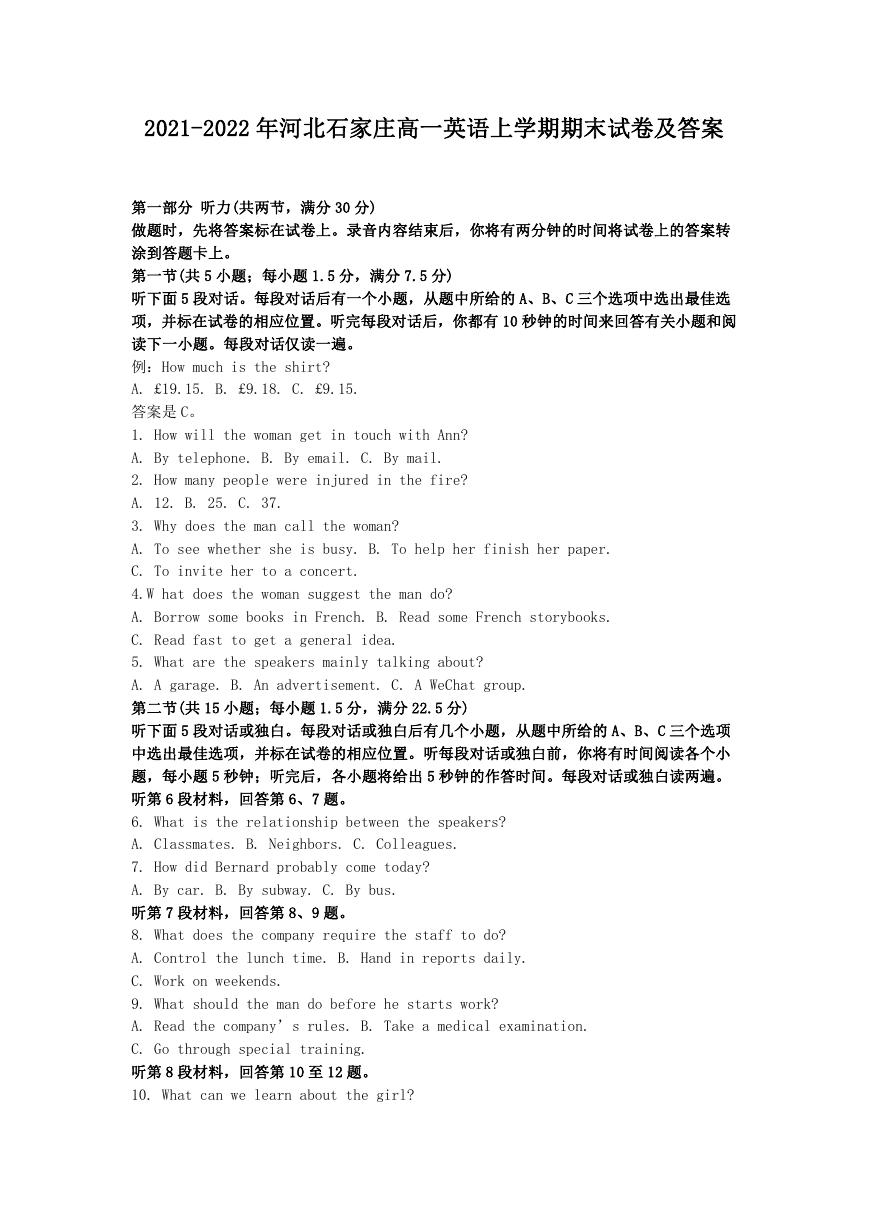
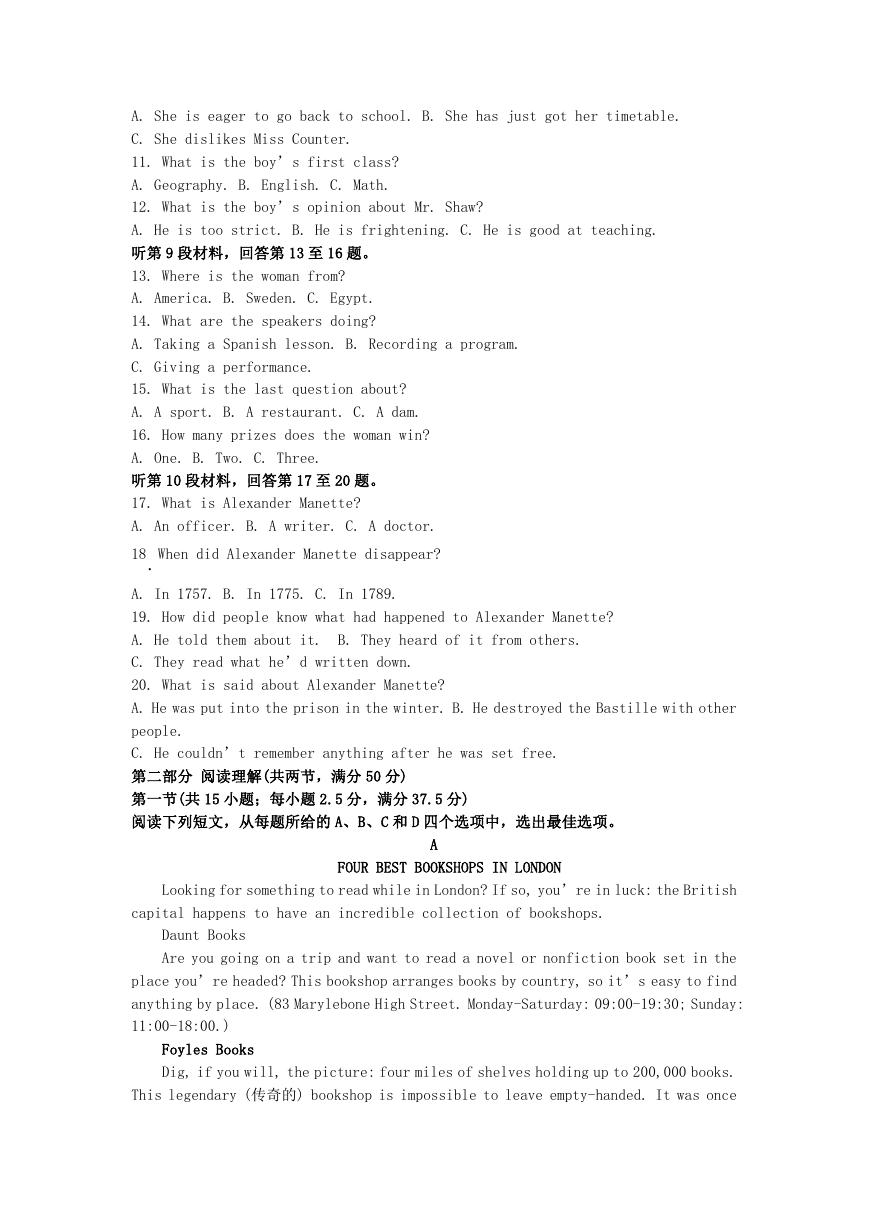
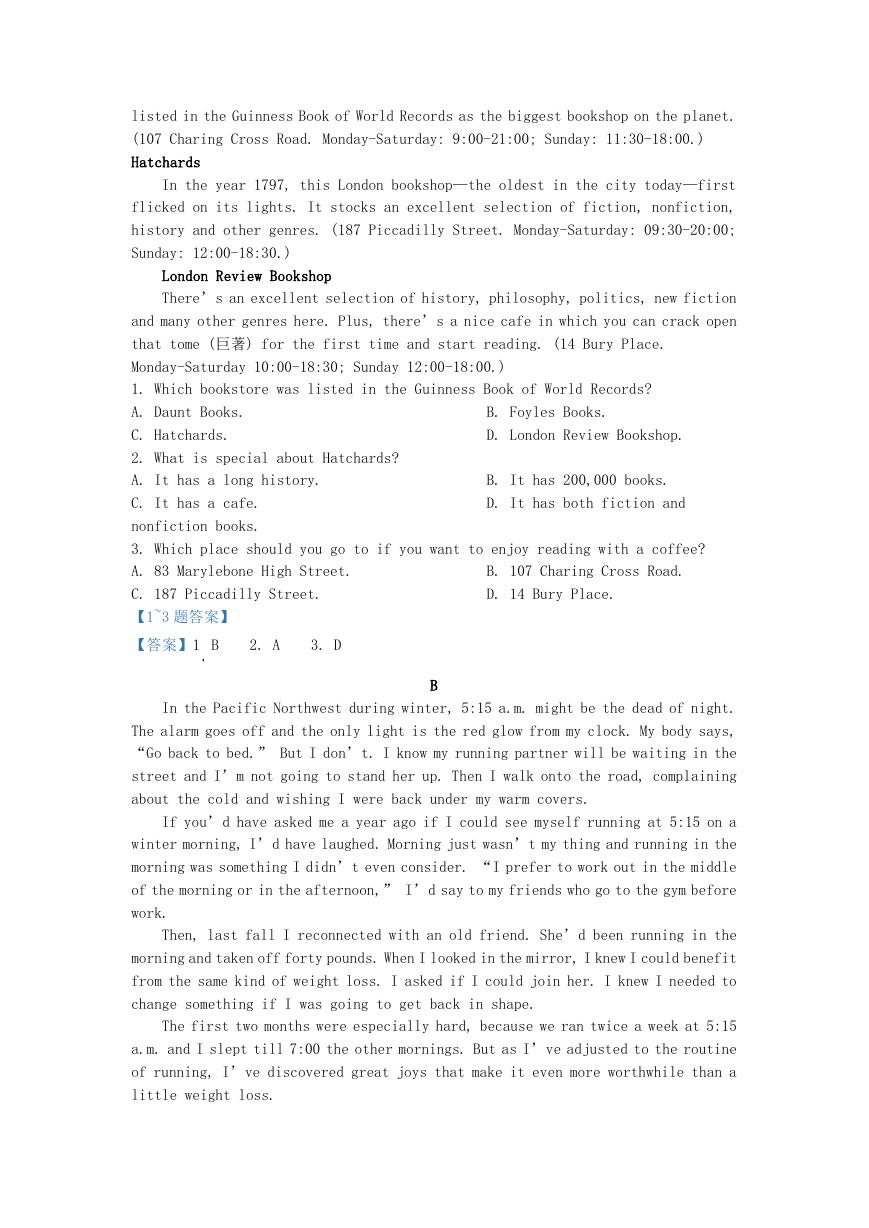
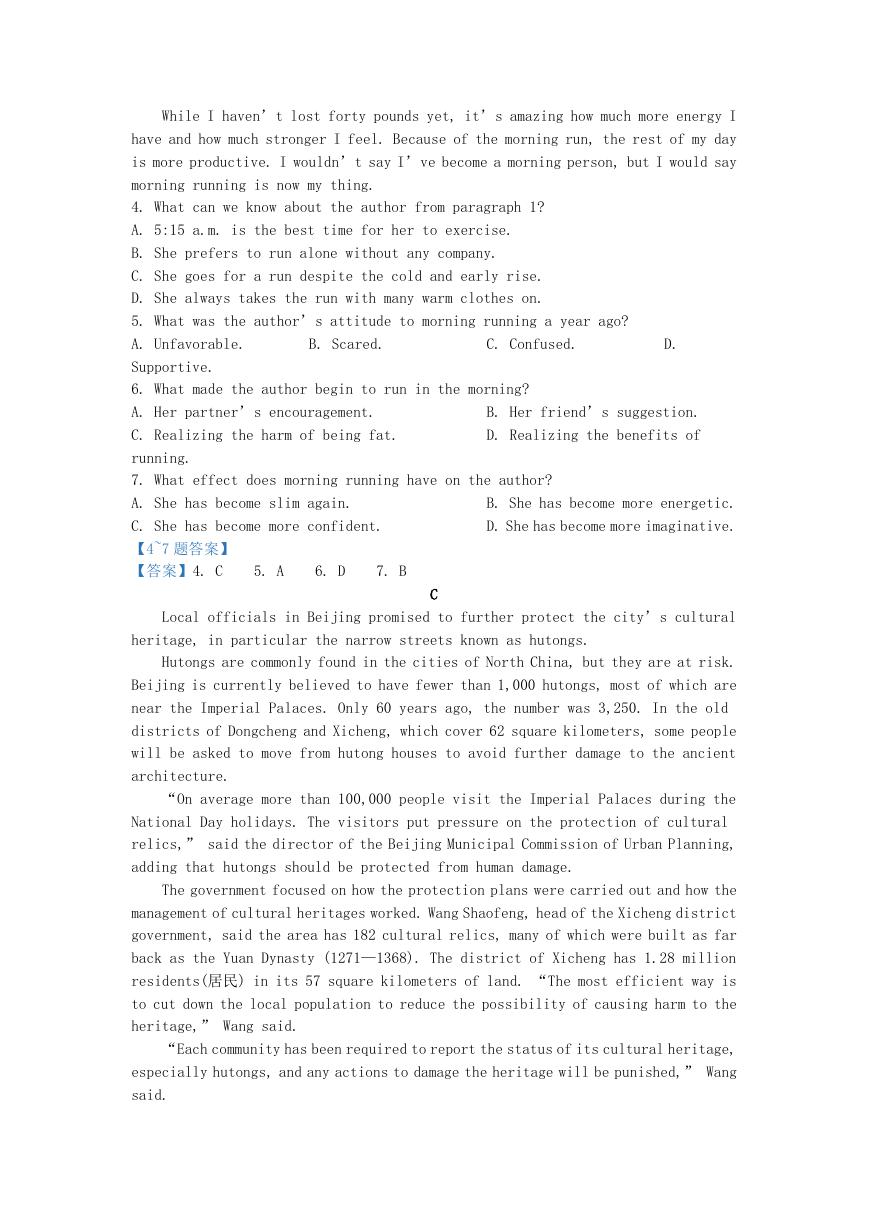
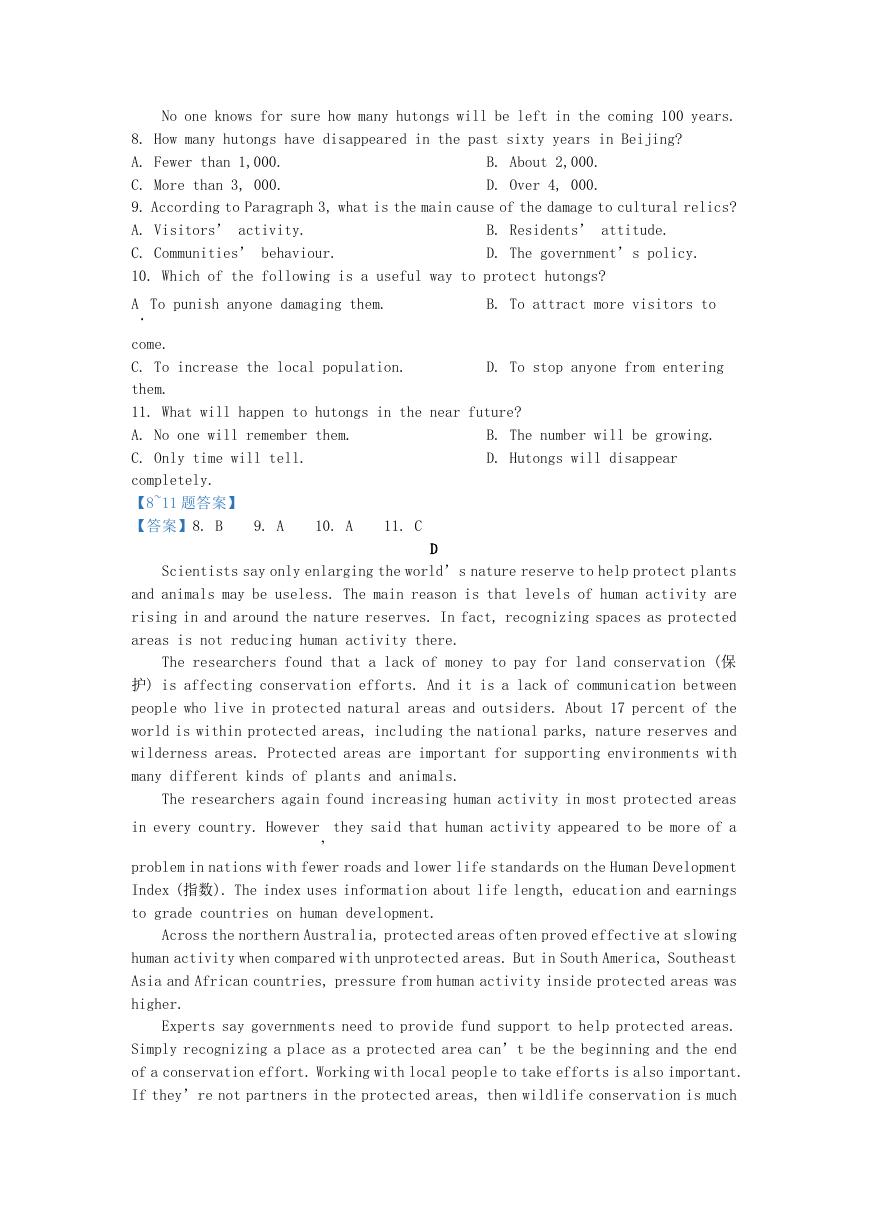
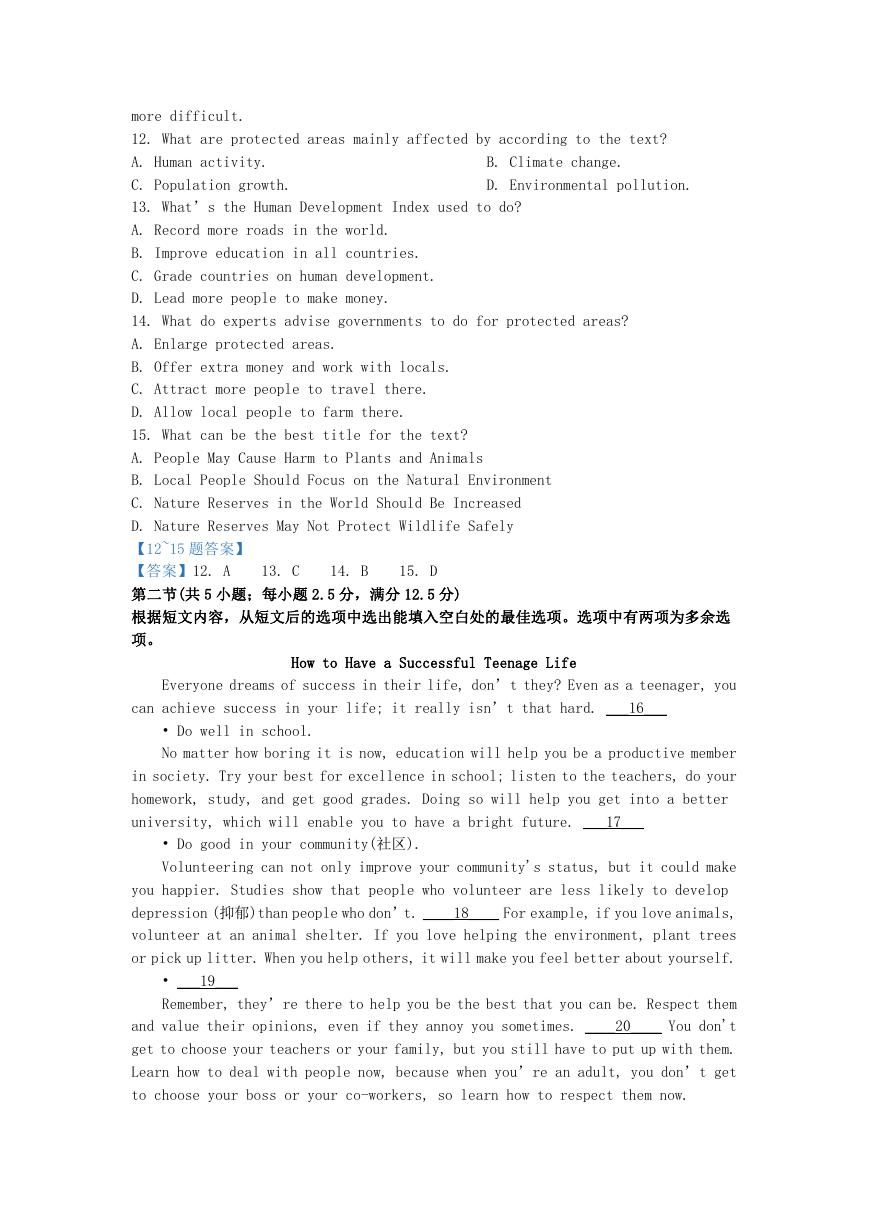
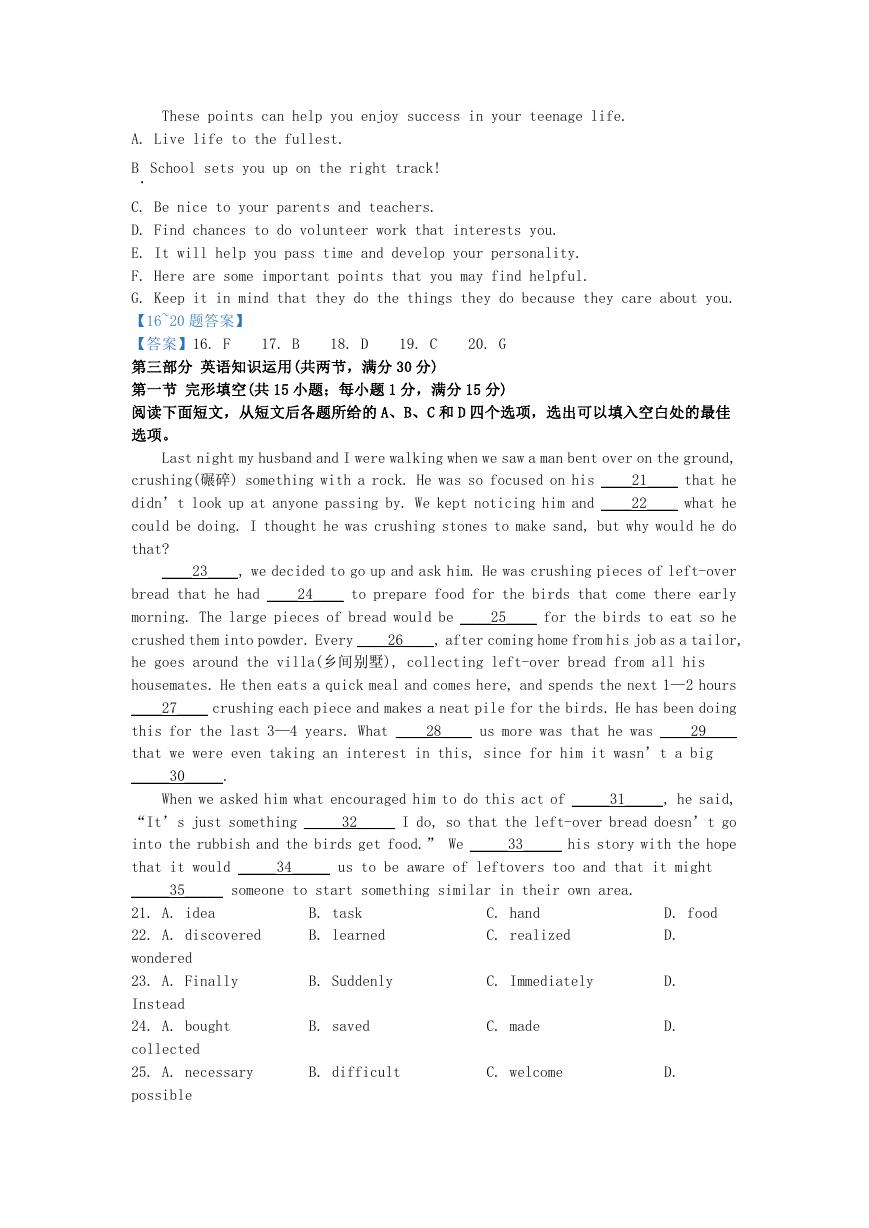
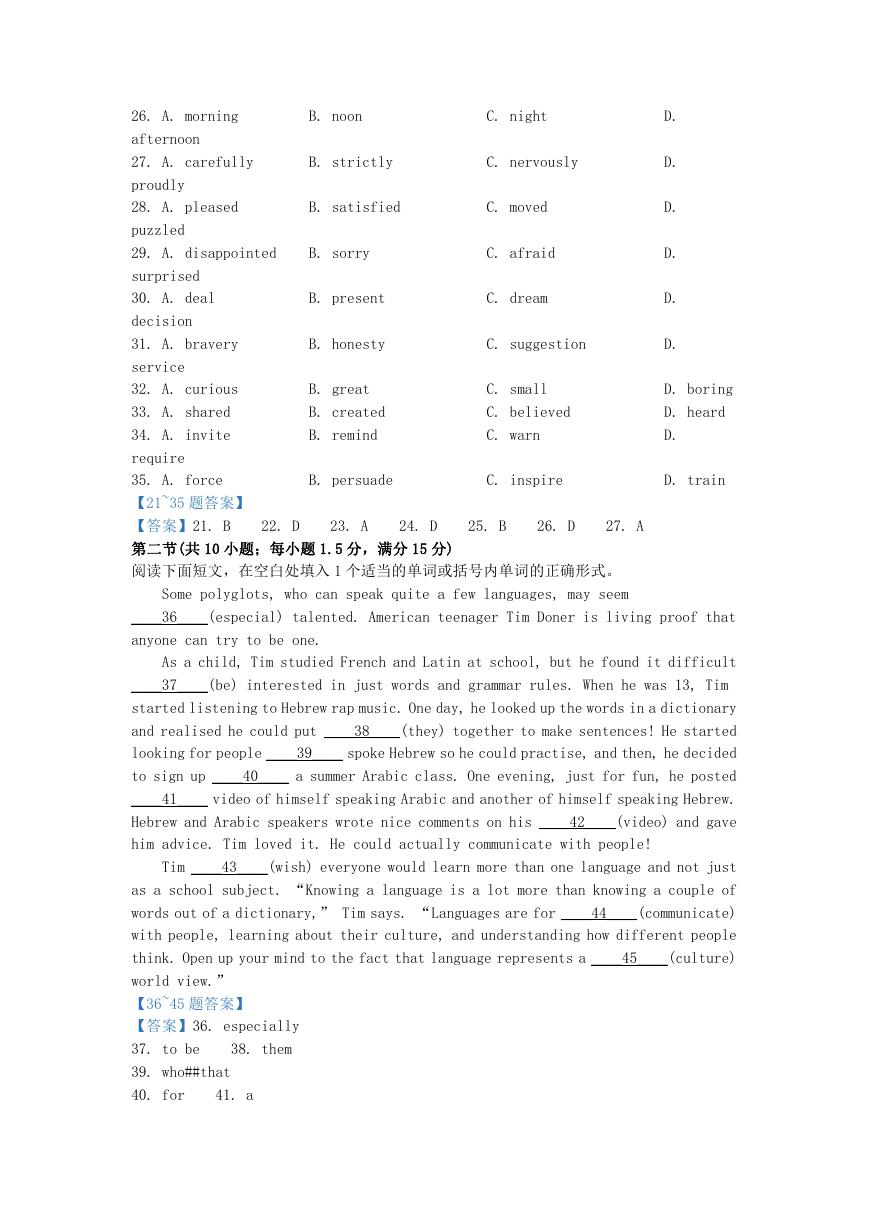








 2023年江西萍乡中考道德与法治真题及答案.doc
2023年江西萍乡中考道德与法治真题及答案.doc 2012年重庆南川中考生物真题及答案.doc
2012年重庆南川中考生物真题及答案.doc 2013年江西师范大学地理学综合及文艺理论基础考研真题.doc
2013年江西师范大学地理学综合及文艺理论基础考研真题.doc 2020年四川甘孜小升初语文真题及答案I卷.doc
2020年四川甘孜小升初语文真题及答案I卷.doc 2020年注册岩土工程师专业基础考试真题及答案.doc
2020年注册岩土工程师专业基础考试真题及答案.doc 2023-2024学年福建省厦门市九年级上学期数学月考试题及答案.doc
2023-2024学年福建省厦门市九年级上学期数学月考试题及答案.doc 2021-2022学年辽宁省沈阳市大东区九年级上学期语文期末试题及答案.doc
2021-2022学年辽宁省沈阳市大东区九年级上学期语文期末试题及答案.doc 2022-2023学年北京东城区初三第一学期物理期末试卷及答案.doc
2022-2023学年北京东城区初三第一学期物理期末试卷及答案.doc 2018上半年江西教师资格初中地理学科知识与教学能力真题及答案.doc
2018上半年江西教师资格初中地理学科知识与教学能力真题及答案.doc 2012年河北国家公务员申论考试真题及答案-省级.doc
2012年河北国家公务员申论考试真题及答案-省级.doc 2020-2021学年江苏省扬州市江都区邵樊片九年级上学期数学第一次质量检测试题及答案.doc
2020-2021学年江苏省扬州市江都区邵樊片九年级上学期数学第一次质量检测试题及答案.doc 2022下半年黑龙江教师资格证中学综合素质真题及答案.doc
2022下半年黑龙江教师资格证中学综合素质真题及答案.doc